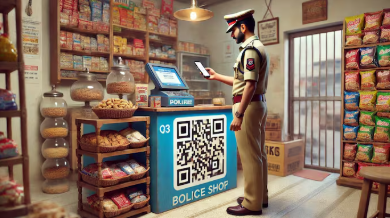Online scams are becoming a growing menace in India. Almost every day, we see individuals falling for the malicious tricks of scammers.
While cyber cells and police are urging citizens to stay cautious, in a surprising incident, a police constable from Pune himself fell victim to cyber fraud, losing Rs 2.3 lakh in a scam involving a QR code.
The victim, who lives in Saswad, near Pune, reported his ordeal to Pune rural police. According to a report by Times of India, the scam began when the victim attempted to pay a bill at a bakery in Saswad. The victim was instructed to scan a QR code to complete the transaction. However, moments later, he noticed an unauthorised debit of Rs 18,755 from his savings account. Alarmed by the unauthorised transaction, he checked his other bank accounts and was shocked to see further unauthorised transactions, including Rs 12,250 from his salary account, leaving only Rs 50 in the account.
The situation escalated when the constable received a one-time password (OTP) notification for a transaction of Rs 1.9 lakh from his gold loan account. Despite not sharing the OTP, the transaction was successfully completed. Additionally, the fraudsters attempted to make two transactions worth Rs 14,000 using his credit card details. Fortunately, the constable acted quickly to freeze his bank accounts and credit card, preventing further losses.
According to the report, the investigation is ongoing, and police revealed that the victim lost money as fraudsters gained access to the constable’s mobile phone and bank accounts through a malicious APK file. It is suspected that the constable may have unknowingly clicked on a malicious link sent by the fraudsters, which allowed them to install malware or spyware on his device. This malware likely enabled the criminals to capture sensitive information, such as login credentials and OTPs, bypassing security measures and accessing multiple accounts.
The police are further investigating whether the QR code itself was manipulated to redirect the constable to download the APK file or if the fraudsters employed other deceptive tactics.
With digital payments becoming increasingly common, protecting oneself from such scams is critical. Here are some tips to stay safe:
Verify QR codes: If paying through a QR code, ensure the receiver is trustworthy and avoid scanning codes from unofficial or suspicious locations.
Check the receiver’s name: Always verify the name of the receiver when scanning a QR code.
Avoid clicking on suspicious links: Never click on unsolicited links sent via text messages, emails, or social media. These links can lead to phishing sites or install malware on your device.
Use official and verified apps: Always use official and verified apps for digital transactions. Download apps only from trusted platforms like Google Play Store or Apple App Store.




